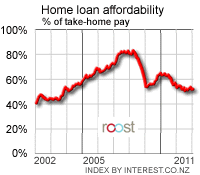Improvement in home affordability stalls in March
The New Zealand Housing Affordability measure from interest.co.nz stalled at slightly worse levels in March, ending an almost unbroken run of improvement over the last year. A small rise in the median house price and an increase in two year mortgage rates combined to make housing less affordable in March from February.
 Tax cuts are expected to improve after tax pay in April, but any further rise in house prices or interest rates is likely to confirm the end of a trend of improving affordability since the beginning of 2008.
Tax cuts are expected to improve after tax pay in April, but any further rise in house prices or interest rates is likely to confirm the end of a trend of improving affordability since the beginning of 2008.
The REINZ median house price rose to NZ$335,000 in March from NZ$330,000 in February, while the average 2 year mortgage rate rose back to 6.09% from 5.92%. These two factors increased the proportion of a single median income needed to service an 80% mortgage on a median priced house to 55.5% in March from 54.0% in March.
This measure of housing affordability had improved to its best level in 5 years in February because of a sharp fall in interest rates and a 6% fall in the median house price. Affordability hit its worst level of 82.9% in November 2007 when house prices peaked.
Many home buyers jumped in March to take advantage of lower interest rates and look for bargains, but interest rates rose in late March and housing market activity is expected to ease off through the colder winter months. The Reserve Bank’s interest rate decision on April 30 and any move in house prices will be watched closely by potential home buyers wanting to get on the ladder.
“Affordability has improved dramatically in the last year, which has helped draw some buyers back into the housing market, but that renewed demand is vulnerable if interest rates keep rising and house prices stop falling,” said Interest.co.nz Editor Bernard Hickey.
“Housing remains unaffordable or nearly unaffordable for many home buyers. Tax cuts introduced in April will help at the margin, but further house price falls would be necessary for significant improvements from here, given longer term fixed mortgage rates appear to have bottomed out,” Hickey said.
Affordability remains slightly out of reach for most individual home buyers. The threshold proportion of after tax income considered prudent to sustainably own a house is around 40%. Anything above that is starting to become unaffordable.
Affordability also worsened for a typical first home buyer. The Housing Affordability report’s measure shows the mortgage servicing proportion worsened to 44.0% in March from 43.1% in February. This measure is for a median income earner aged 25-29 buying a first quartile home. Interest.co.nz thinks the ‘affordable’ threshold is 40% for such a home buyer.
The report’s measure of affordability for a ‘typical’ household shows that proportion rose to 36.3% in March from 35.3% the previous month. This ‘typical’ household includes one 30-34 year old male earning a median income, one 30-34 year old female earning 50% of a medium income and one child over five. Interest.co.nz thinks the ‘affordable’ threshold is 30% for such a household.
The report’s measure of a ‘typical’ first home buying household shows the proportion required to buy the first quartile home worsened slightly to 22.8% in March from 22.3% in February. It has, however, improved from 34% a year ago and 34.9% at its peak in November 2007. This measure is for one full time male aged 25-29 and one full time female aged 25-29 with no kids. Interest.co.nz considers the affordability threshold for this group as 30%, although that doesn’t leave room for children.
10 of the 12 regions surveyed in the Home Loan Affordability report showed deteriorations in affordability, including Auckland, Wellington, Christchurch and Southland. Waikato/Bay of Plenty and Manawatu/Wanganui were the only regions to show improvements because house prices fell in those regions.
Southland continued to be the cheapest region in the nation with the typical home buyer having to pay 33.1% of take-home pay to afford the mortgage on a median house. The most expensive region was the Central Otago Lakes region on 77.9%.
Posted: 17 Apr 2009
News articles
Browse articles
by date


